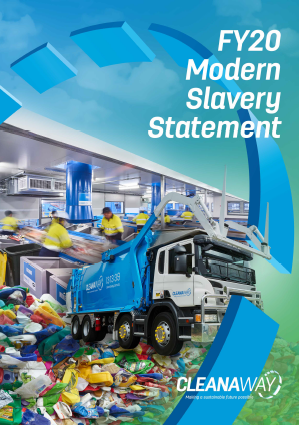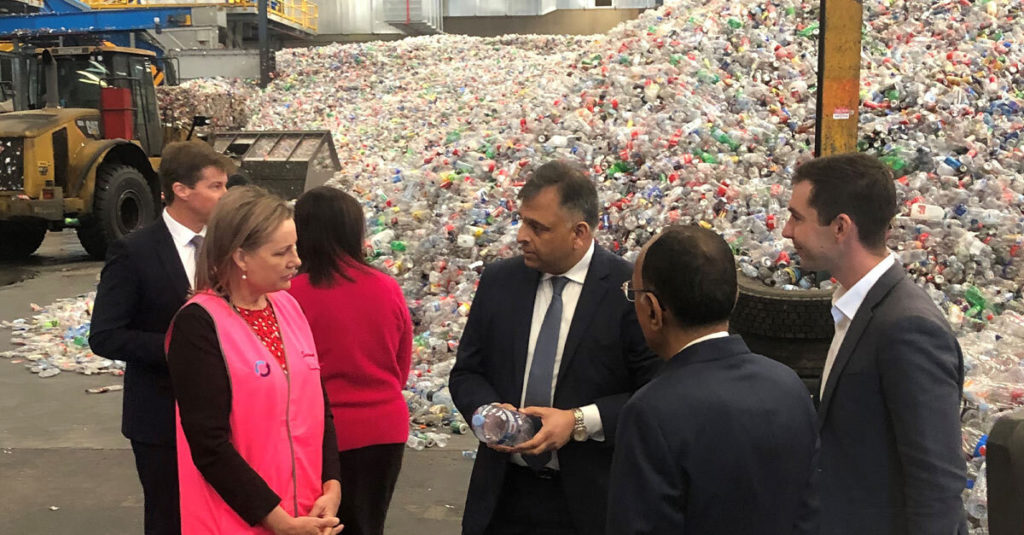Cleanaway CEO and Managing Director Vik Bansal sets out the urgent steps necessary to fix our recycling system and make Australia a world-leader in building a circular economy.
China’s 2018 refusal to accept our waste for recycling was a wake-up call that has forced us to confront the challenge and recognise the opportunity to improve our local infrastructure to collect, process and re-use valuable recyclable materials. This will deliver a massive boost for our economy and natural environment.
While government, industry and the public are rising to the challenge of achieving true closed loops for several recoverable resources, there is still so much more that can be done.
The waste and recycling industry is a significant contributor to Australia’s economy with an annual turnover of $15 billion, and 50,000 full time equivalent employees, but this contribution could easily double in size in the coming decade. Building a world-class closed loop economy presents an enormous opportunity for growth, increased employment and exponential environmental benefits that we cannot afford to waste.
Here are four vital steps needed to deliver huge returns for Australia:
Step 1: National plans, targets and standards
Australia has had a National Waste Policy since 2018, but it has voluntary targets which are still yet to be endorsed by our federal and state environment ministers. As a result, we haven’t yet seen enough formal action plans, targets or program funding streams. We also need the Federal government to bring policies and regulations into line nationally.
However, the Australian Government’s recent $190m Recycling Modernisation Fund (RMF) will provide a much-needed boost to Australia’s resource recovery infrastructure and is a positive step towards a circular economy. This injection gives the waste management industry confidence when investing in infrastructure and innovation.
The RMF is expected to generate $600 million of recycling investment, create more than 10,000 new jobs and divert more than 10 million tonnes of waste from landfill through investment in new infrastructure to sort, process and re-manufacture materials such as mixed plastic, paper, tyres and glass.
With a national waste policy in place with stringent targets and a clear roadmap to allow certainty for recyclable volumes, investment in infrastructure becomes an easier decision, jobs are created and our domestic processing and value-adding industries can flourish.
Step 2: Product stewardship
The Australian government must introduce tighter product stewardship laws to ensure manufacturers and retailers take responsibility for the products they sell once they become waste. Laws on mandatory recycled content in packaging will have a similar effect. These steps – currently planned but yet to be implemented – should ensure a smoother transition toward a circular economy, with manufacturers required to consider the total life cycle of their products and packaging.
Step 3: Public participation
Of course, there’s no use building the massive infrastructure designed for a circular economy without the recyclable materials to process. This is where it’s vital to educate and enthuse the public to embrace recycling.
Even when much of our household recycling goes into the right bin, contamination like food, plastic bags, textiles and e-waste can actually damage other valuable material to the extent that an entire truckload of recycling can be lost.
That’s why accurate household recycling is absolutely vital. Australia still only recycles about 16 per cent of the 3.4 million tonnes or so of plastics we use annually, so we still have a lot of work to do! Container return schemes are a great option in this context as the sorting happens at disposal – maintaining the quality of material for recycling.
Recycling systems and infrastructure vary by state and municipality, which creates consumer confusion. What may be recyclable at work may not be recyclable at home, and vice versa. Different coloured bins, different on-pack symbols and different recycling rules only add to the confusion.
We need better education and a standardised national approach to recycling programs by government and industry, so that consumers know how best to play their important part in the system.
Step 4: Investment in closing the loop
But a circular economy is impossible unless people buy more products made from reclaimed materials.
Our recent joint venture with Pact Group and Asahi Beverages in a plastic pelletising plant in Albury NSW to collect and convert almost one billion used PET bottles into new bottles is a great example of what is achievable when the right environment is created for industry to invest in the sector’s future.
The opportunity to lead the world in creating a circular economy has an abundance of benefits: boosting employment, productivity gains, innovation, and a reduced ecological footprint. Conversely, missing the opportunity to reform our waste recovery system will have the opposite effect – reduced employment, wastefulness across related industries, no innovation, unnecessary depletion of natural resources, and greater damage to our fragile environment.
About Cleanaway
Cleanaway is Australia’s leading waste management, recycling, industrial and environmental services company. With our dedicated team, national network of specialised infrastructure assets,
and one of the largest fleets of waste collection vehicles on Australian roads, we’re working towards our mission of making a sustainable future possible, for all Australians.

Cleanaway is committed to our priority SDGs aligned to the UN’s Sustainable Development Goals. This includes our commitment to build resilient infrastructure, promote sustainable industrialisation and foster innovation; make cities and human settlements inclusive, safe, resilient and sustainable; and ensure sustainable consumption and production patterns.
Find out more in our 2020 Sustainability Report.



